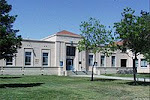
This is paragraph from Thomas Macaulay's essay reviewing Hallam's history of England. They are remarks about the situation at the beginning of the complete between Charles I and the Long Parliament that ended in the Civil War. The painting by a William Shakespeare is titled, 'The Wounded Cavalier'.
But the great security, the security without which every other
would have been insufficient, was the power of the sword. This
both parties thoroughly understood. The Parliament insisted on
having the command of the militia and the direction of the Irish
war. "By God, not for an hour!" exclaimed the King. "Keep the
militia," said the Queen, after the defeat of the royal party.
"Keep the militia; that will bring back everything." That, by the
old constitution, no military authority was lodged in the
Parliament, Mr. Hallam has clearly shown. That it is a species of
authority which ought, not to be permanently lodged in large and
divided assemblies, must, we think in fairness be conceded.
Opposition, publicity, long discussion, frequent compromise;
these are the characteristics of the proceedings of such
assemblies. Unity, secrecy, decision, are the qualities which
military arrangements require. There were, therefore, serious
objections to the proposition of the Houses on this subject. But,
on the other hand, to trust such a King, at such a crisis, with
the very weapon which, in hands less dangerous, had destroyed so
many free constitutions, would have been the extreme of rashness.
The jealousy with which the oligarchy of Venice and the States of
Holland regarded their generals and armies induced them
perpetually to interfere in matters of which they were
incompetent to judge. This policy secured them against military
usurpation, but placed them, under great disadvantages in war.
The uncontrolled power which the King of France exercised over
his troops enabled him to conquer his enemies, but enabled him
also to oppress his people. Was there any intermediate course?
None, we confess altogether free from objection. But on the
whole, we conceive that the best measure would have been that
which the Parliament over and over proposed, namely, that for a
limited time the power of the sword should be left to the two
Houses, and that it should revert to the Crown when the
constitution should be firmly established, and when the new
securities of freedom should be so far strengthened by
prescription that it would be difficult to employ even a standing
army for the purpose of subverting them.





















No comments:
Post a Comment